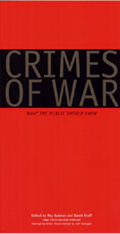


| The Boston Book Review "...this book is based on the optimistic premise that the first step towards achieving justice and accountability is the public's understanding of the 'moral and legal benchmarks' contained in the laws governing war." Evening Standard "The shaming thing for anyone who has covered conflicts is the immediate and crucial knowledge gaps that Crimes of War reveals. Few of us who toured through the Balkans this spring and summer, bandying about phrases like "crimes against humanity", had any real idea of their exact legal definition." The Guardian (London) "Crimes of War was edited by Roy Gutman and David Rieff, two American journalists who were radicalised by the horrors they witnessed in Bosnia. It is a riveting mixture of reporters’ accounts of war crimes in every continent, coupled with essays by lawyers on international humanitarian law. The authors’ original motive was to educate those whose professional life includes war into understanding that what they see or hear about while doing their normal duties may not just be a crime – arson, rape, looting, murder—but a war crime. In the spirit of the new globalised international conscience, the aim is for witnesses to realise that these war crimes can be tried in international courts. Instead of just writing their reports, shaking their heads, and moving on, they should help the prosecution." The Independent (London) "journalists witnessed and reported numerous war crimes without the slightest expectation on the part of reporter or perpetrator that anyone would ever be brought to justice. Crimes of War says that this is all beginning to change. Now it doesn’t seem so improbable that Karadzic and even the Yugoslav President, Slobodan Milosevic, may have to face an international war crimes tribunal." International Legal Practitioner "When collated, despatches and war photography can often have an unpleasantly iconic and voyeuristic quality, but here they are placed squarely in context, and serve as a reminder of the invaluable role that journalists now play in monitoring such international norms as may be said to exist." Kirkus Reviews "The book both informs and appalls, and it is meant to. ...this is a work of singular importance." Neiman Reports "As the bloodiest century in history comes to a close, it is imperative that the promise of the Geneva Conventions be fulfilled. To do so we need a better understanding of modern war crimes and a stronger commitment to the evolving strategy of addressing them. "Crimes of War" is a solid contribution to the former and provocative inspiration to the latter." New Law Journal (UK) "By enlisting a large number of distinguished journalists, lawyers and politicians to examine over 1000 topics in a 1000 words or so, what has been produced is a kind of miniature encyclopedia of war, but written very much from a humanitarian and reformist perspective." The San Francisco Chronicle "It would be hard to imagine a more illustrious group of war correspondents than the contributors to Crimes of War, a sturdy, informative handbook focusing on international humanitarian law and the ways it is breached during violent conflicts." Sunday Record "There are 140 articles on everything from acts of war to genocide to child soldiers to refugees. They’re written in clear, readable style by 90 journalists, legal experts, and historians, most of whom are well-versed in covering conflicts…. The result is a book that upsets and disturbs as much as it enlightens and educates." The Times Higher Education Supplement "Editors Gutman and Rieff have produced an important book. It is accessible to the ordinary reader and turns difficult international legal concepts into digestible articles. Importantly, the analysis is as objective as is possible in a field so full of passion and outrage. The text remains cool, while the black and white photographs drive home the horrors of war crimes. It is a book that should be available to ordinary soldiers during training." Times Literary Supplement "The quality of the contributors makes this a reliable enterprise, but it cannot be a reassuring one. The book would not have been conceived if the laws of war were well observed and human rights in time of war decently respected. The dreadful fact is that our end-of-the-century conflicts produce conduct as bad as anything known to history; and very little of it ever gets brought to the bar of justice…As constant a theme in these pages as the familiarity and ubiquity of criminal conduct is an insistence that war criminality can be identified and testified to."
|
|
|
